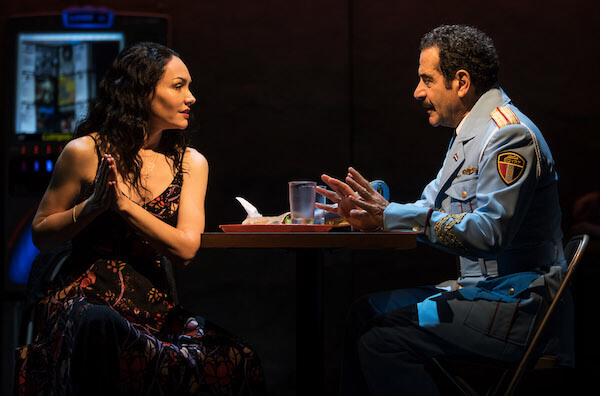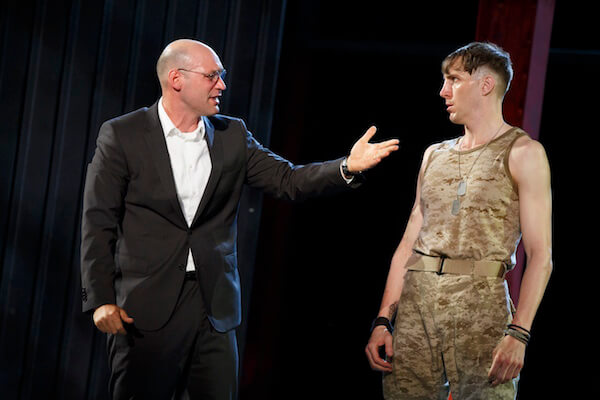Nikhil Saboo and Troy Iwata in “The Boy Who Danced on Air.” | MARIA BARANOVA
Ritualized pederasty, sex slavery, and ongoing abuse are difficult topics for a musical. Yet they are the ingredients in the toxic stew of a show with the shockingly romantic name “The Boy Who Danced on Air.” The subject matter is drawn from a 2010 documentary that chronicles an Afghani tradition of bacha bazi (coyly translated as “boy play”) in which wealthy men purchase unwanted, underage boys to use for sex. Oh, and the boys are also forced to dance for the entertainment of their owners and other men, and they are often shared.
The great, religious hypocrisy underlying all of this is that these good men of faith are not allowed to touch any woman other than their wives. But, as one of the characters explains, “men have needs.” Easy answer. Buy a poor boy who can’t object and must submit to any demand. You get your rocks off, and you’re still honoring your faith. It’s all cool. After all, this loophole is traditional. And, yes, it’s still going on in 2017.
This particular grisly story concerns Paiman, who, at age 10, is bought from his parents and told he’s not wanted and now belongs to 40-year-old Jahandar. Paiman is such a talented dancer that Jahandar won’t beat him so much, though he’s plenty violent. Because of his great affection, Jahandar doesn’t loan Paiman out to his horny friends and is even going to marry him off so he won’t starve in the street. How considerate.
A cynical musical romanticizes child abuse; an evening of illusion; and a tuner that almost makes it
Over time, Paiman falls in love with Feda, another sex slave, and they plan to run away. They better hurry because once they get too old, about 16, Feda will be discarded and thrown away to fend for himself, and so will Paiman if he doesn’t accept the forced marriage. There’s also an irrelevant subplot that has Jahandar trying to resist changes brought on by the recent American intervention in Afghanistan. From a narrative point, this detracts from the “love story” between the two young men.
The clunking book and lyrics by Charlie Sohne are obvious and amateurish. The derivative music by Tim Rosser has a lot of pop infused swoops and overwrought bellows but no sophistication. The cast is actually quite good with strong voices that are superior to the material, notably Jonathan Raviv as Jahandar, though he plays a completely irredeemable character. Paiman and Feda are played by men at least in their late 20s, Troy Iwata and Nikhil Saboo, respectively, presumably because the image of a man beating and raping a real teenager might be too much to watch, even performed in shadow behind a scrim as it is here. Iwata and Saboo are strong singers and very good in the erotic dances they perform dressed as women, presumably to arouse the older men who ogle them.
Were this show performed in a larger theater, I would expect protests. The romanticizing of such egregious abuse and deeply offensive way in which this “tradition” is celebrated are as surprising as the ignorant cynicism of the creators, which should enrage anyone who values human rights. Moreover, this has been promoted to the LGBTQ audience as an uplifting gay love story, which is as insulting as it is misguided and assumes that horrors can be excused when cute boys kiss. Make no mistake: for all its pretensions, this is a musical about child abuse, sex trafficking, and unspeakable torment rationalized in the name of religion. It is nothing to sing about.
Derren Brown in his solo show he wrote with Andrew O’Connor and Andy Nyman. | AHRON R. FOSTER
Derren Brown is an amiable mentalist whose show at the Atlantic, “Secret,” is an engaging evening of dazzling, well-performed tricks and a bit of confessional theater. For instance, Brown seems eager to let us know early on that he came out at age 31, though that has little to do with anything else in the show. Thanks for sharing, though.
The show gets its tension from the understanding that everyone in the audience has a secret and Brown, in his gruffly charming way, may get it out of you. Indeed, he manages to do just that with several of the people chosen. Brown, however, insists he’s not a psychic and readily admits that what he’s doing is playing tricks. He even gives some indications early on of how he does it. That’s a smart, theatrical move because it keeps us thinking we might be able to figure out how he does the astonishing things he does. He is also a hypnotist and seems to pull that off in two cases.
The show written by Brown with Andrew O’Connor and Andy Nyman is nicely crafted with some fascinating sidebars on how our stories shape our perceptions and us. It does become a bit draggy at its two-and-a-half-hour running time, and many of the tricks are versions of the same thing, engaging though they are. The ending is quite remarkable and ties all the piece together neatly.
The audience is sworn to secrecy, so I’ll respect that. Suffice it to say that if you like to have your mind played with, it’s hard to imagine a more congenial fellow to do just that while putting on a mesmerizingly memorable show.
Corey Cott in Rob Taylor and Richard Oberacker’s “Bandstand,” directed by Andy Blankenbuehler. | JEREMY DANIEL
“Bandstand” is a well-meaning musical that has moments of pure brilliance, bogged down by a story that doesn’t know where it wants to go. Set in 1945, the show tells the tale of war-damaged Donny Novitski trying to get his life together as a musician in Cleveland. He meets the widow of his best friend, Julia Trojan, when he goes to call on her as the one who lived. It doesn’t go well, but, this being a fairly conventional musical, eventually the two team up to sing and, through fits and starts, become successful and, no surprise, fall in love.
The book by Rob Taylor and Richard Oberacker has a hard time finding its footing, muddled between the story of a musical group’s rise and a serious look at the personal costs of war. While these two tales aren’t wholly incongruous, the show doesn’t really jell until the second act, when it becomes more direct and leads us to the happy ending. With Andy Blankenbuehler’s direction and choreography, however, the show is lively and largely appealing throughout.
You will leave on a high thanks to the strong performances by the extraordinary company and Oberacker’s proficient music that marries pastiche and tuneful originality. Corey Cott as Donny is excellent. He’s got a great voice and a range that wasn’t used sufficiently in the unfortunate “Gigi” a couple of years ago. He’s really in his element here, however. Laura Osnes as Julia continues to astonish with her voice that has an uncanny power and versatility. She’s become one of Broadway’s most appealing leading ladies. Beth Leavel as Julia’s mother is terrific, carrying the comedy and touching hearts with her exceptional timing and assured voice. The rest of the company is every bit as good, and they play as the band of veterans assembled by Donny.
You can’t deny the emotional impact of the show’s ending nor the serious intents of the creators, but it too often relies on our collective memory of other war-time musicals and obvious tugs at heart strings. One can’t help wishing “Bandstand” had earned a little more of its impact on its own merits.
THE BOY WHO DANCED ON AIR | June Havoc Theatre, 312 W. 36th St. | Through Jun. 11: Tue.-Sat. at 7:30 p.m.; Sat at 2:30 p.m.; Sun. at 2 p.m. | $65 at abingdontheatre.org or 212-352-3101 | Two hrs., 30 mins., with intermission
DERREN BROWN: SECRET | Atlantic Theater Company | 336 W. 20th St. | Through Jun. 25: Tue. at 7 p.m.; Wed.-Sat. at 8 p.m.; Sat.-Sun. at 2 p.m. | $65 at ovationtix.com or 866.811.4111 | Two hrs., 40 mins., with intermission
BANDSTAND | Bernard B. Jacobs Theatre, 245 W. 45th St. | Tue., Thu. at 7 p.m.; Wed., Fri.-Sat. at 8 p.m.; Wed., Sat. at 2 p.m.; Sun. at 3 p.m. | $59-$159 at telecharge.com or 212-239-6200 | Two hrs., 30 mins., with intermission




































